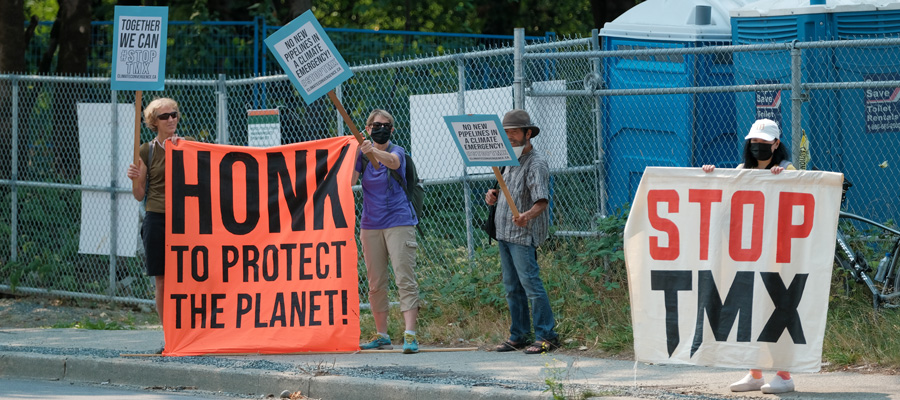Trudeau government justification for purchasing Trans Mountain project based on false premises

So how sound are the claims being used to justify the federal government’s expenditure of up to $12 billion in taxpayer funds to purchase Kinder Morgan’s Trans Mountain expansion (TMX) project?
The Trudeau government says the purchase is in the ‘national interest’, will create thousands of jobs, and that delays in the project are costing Canada $15 billion per year. The total cost for the federal government includes $4.5 billion for existing Trans Mountain assets, plus a notional $7.4 billion for construction of the expansion.
The jobs argument has been thoroughly debunked. Most jobs would be in construction of the pipeline and end with completion in late 2019 or 2020. Permanent jobs upon completion of construction would be 40 in Alberta and 50 in BC, according to Kinder Morgan’s application to National Energy Board (NEB).
The claim that delays in the pipeline are costing Canada $15 billion per year bears closer examination as it has been used repeatedly by the Notley and Trudeau governments to justify the project, and has been widely cited in the media.
A little digging reveals this number came from a Scotiabank report published on February 20. The report states: “If maintained at current levels, the discount on Western Canadian oil [due to delays in pipeline approvals] would shave C$15.6 billion in revenue annually from the sector.”
The jobs argument has been thoroughly debunked.
At the time this report was published, the discount between Western Canadian Select (WCS), the Canadian heavy oil benchmark priced at Hardisty Alberta, and West Texas Intermediate (WTI) priced at Cushing Oklahoma, was US$32.10 per barrel.
Scotiabank correctly pointed out that the discount between WCS and WTI is normally about $13, but an outage on the Keystone export pipeline due to a spill in South Dakota in mid-November 2017 caused a 20-per-cent reduction in capacity and resulted in a spike in the discount. The discount is normally made up of an $8 per barrel quality discount due to the higher cost of refining heavy oil, and a $5 per barrel transportation cost from Hardisty to Cushing.
Scotiabank also pointed out there will be a deficit of pipeline capacity until one of the three currently approved pipelines is completed—now slated at the earliest for late 2019 or 2020. Any one of these—Keystone XL, Line 3 or TMX—would serve the purpose. Hence the federal and Alberta governments’ insistence that the lack of TMX is costing Canada $15 billion per year is a bogus argument.
Digging deeper in the Scotiabank report reveals they expected the discount to be lower through 2018, averaging $21.60 per barrel. And with more rail transport, as is highly likely, they expected the discount to average $18 per barrel. So now we are down from $15.6 billion per year to $6.7 billion per year.
Looking still deeper, we see that the May 18 discount was actually $13 per barrel—exactly the long-term average, which means the discount that day was costing the oil sector in Canada precisely nothing. The spike in the discount was temporary and caused by exceptional circumstances. With two other approved pipelines likely to be built in the same timeframe, TMX delays are not costing Canadians anything.
The federal and Alberta governments’ insistence that lack of TMX is costing Canada $15 billion per year is a bogus argument.
The oft-cited claim that a price premium awaits if only Canadian bitumen could be exported to Asia via TMX is also untrue.
The Scotiabank report noted that the discount is due to quality and transport costs, and other reports point out that the discount to Asia would be greater than to the US Gulf Coast owing to higher transportation costs.
In light of the much-needed larger conversation on Canada’s energy future and commitments to reduce emissions, false claims of grievous financial damages over the impasse on TMX are a distraction.
The environmental concerns of BC are real and the justifications for purchasing TMX are flimsy indeed. Both the Notley and Trudeau governments are facing elections next year but pushing through this purchase based on false premises in order to save face and preserve political capital is a disservice to the long-term interests of Canada.
Canada needs an energy plan based on more than politically motivated rhetoric. Meeting future energy security needs and climate commitments, given current projections in the absence of political leadership, will otherwise be virtually impossible.
—
David Hughes’ most recent co-publication by the Canadian Centre for Policy Alternatives, Corporate Mapping Project and Parkland Institute is Canada’s Energy Outlook: Current realities and implications for a carbon-constrained future. It is available at energyoutlook.ca.
This piece originally appeared in Maclean’s.
Topics: Climate change & energy policy


